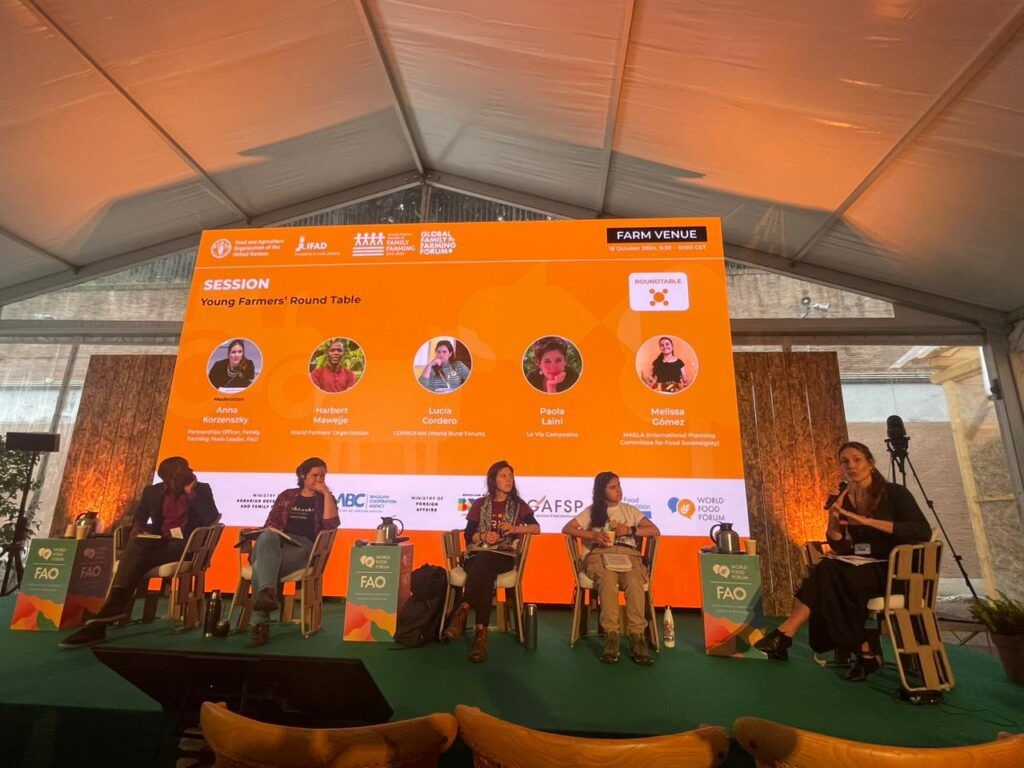‘Peasant seed systems prove that innovation is not always digital’, says Paola Laini of La Via Campesina at the UNDFF Midterm Forum

Several delegates from La Via Campesina organizations participated in the World Forum on Family Farming: Midway through the United Nations Decade of Family Farming – UNDFF- (2019-2028), which took place in Rome from 14 to 18 October. Paola Laini from La Vía Campesina Europe and the youth of the movement participated in the Session of Young Farmers’ Roundtable on the 18th of October. Below is Paola’s intervention at the UNDFF.
As La Via Campesina, as peasants and farmers who are facing the raise of digitalisation in our farms and lives, we have started a process of internal reflection on how digitalisation is impacting our rights. And this is already a challenge as technological development moves very fast and we, as the biggest global movement of peasants, move very slow because inclusivity takes time.
What we have agreed until now is that the current implementation of digital technologies serves to reinforce the power of corporations – of agribusinesses but also high-tech corporations – and aggravates the violation of our rights as peasants. Examples include accessibility and costs, data grabbing (same as knowledge grabbing), and breaking connection to nature, etc.
And we must admit that this outcome is due to the fact that the current legal and political frameworks are not suitable to orient digital technologies towards social and ecological justice, including the respect of peasants’ rights as written in the UN Declaration on the Rights of Peasants and Other People Working in the Rural Areas (UNDROP) and of Indigenous People’s rights as written in UNDRIP. The only way to make digitalisation fulfil its promoise of feeding the world sustainably is enabling public policies bound to these Declarations and other legally binding instruments.
Today I was asked to talk about collective actions to protect the rights of peasants against the risks of digitalisation. Peasant seed systems – which are very different from industrial seed systems – represents one of the strongest example in this sense.

Differently from several digital technologies which are often standardized, inaccurate and vulnerable to shocks – peasant seed systems are more resilient and are adapted to local conditions. Peasant seed systems rely on ancestral peasant knowledge, collective practices and complex social and ecological relations and they are the key ingredient of agroecology and social innovation (two sphere that are mostly ignored by research and development). Peasant seed systems prove that innovation is not always digital!
Peasant seed systems can exist only when the Right of Peasants to use, reproduce, sell and exchange their seeds is protected. Autonomy and ownership over the knowledge behind seeds is necessary for peasants to keep control over farming resources so that peasant innovation can continue and evolve with changing conditions.
However, digitalisation is endangering the peasant Right to Seeds due to the the development of modern biotechnologies and specifically new GMOs or New Breeding Techniques. The most warning aspect for us is the impact that patents on these new techniques will have on our Right to our seeds but also the fact that their deregulation can make it impossible for us to freely choose if we want to use these GMO technologies or not.
To safeguard peasant seeds systems we need regulatory frameworks at different levels that enforces peasants’ rights over seeds. Here we call for the application of related Articles of the UNDROP and International Treaty on Plant Genetic Resources for Food and Agriculture (ITPGRFA) (in particular, article 9 and 12), the application of the precautionary principle and respect for the Cartagena protocol of the Convention on Biological Diversity.
As La Via Campesina, we always bring to the attention the fact that we are dramatically losing peasants and small-scale farmers, everyday, everywhere. The only digitalisation that we are willing to discuss about is one which can help reverse this trend, although we feel that we are very far from this scenario.
As a young person I can say that for sure digitalisation is not a priority for me compared to the need for access to land and fair incomes, which are instead the biggest obstacles for young people to enter farming hence they must be prioritized in food policies.
